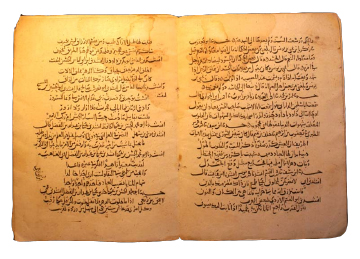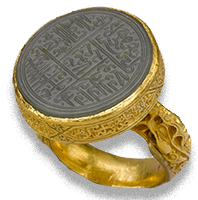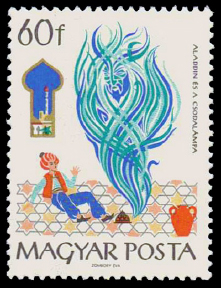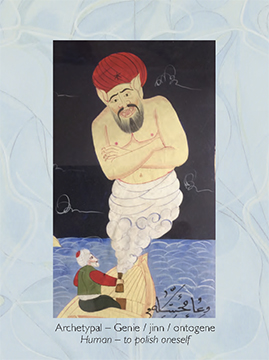The Djinn
ʻAlāʼ ad-Dīn and the lamp
The allegorical story of ʻAlāʼ ad-Dīn علاء الدين [Ala’din, Alladin] is a very striking allegorical teaching story. This tale is part of The Thousand and One Nights, a compilation of teaching stories that have circulated in the Middle East for hundreds of years. Below we have retold part of the tale, shortening parts of it for brevity. In its entirety, ʻAlāʼ ad-Dīn’s story delves into many parts of the human psyche and human condition. It is a classic teaching story, possible Sufi (Islamic), that imparts simple yet deep truths.
In a city called Baghdad in a faraway land lived a young ne’er-do-well named ʻAlāʼ ad-Dīn. His father, a businessman, had come across difficult economic times. He had failed in his attempts to encourage his son to accompany him in his business. Due to these aggravated circumstances, ʻAlāʼ ad-Dīn father found life difficult, and feeling unsupported, his spirit waned and he died. He left his wife, a seamstress, with nothing save her indolent and rather lost son and her own skills, to provide the little money that the two lived upon.
A magician from Africa came across ʻAlāʼ ad-Dīn as he mingled in the bazaar, and he pretended to be the long-lost brother of the boy’s father. He gave ʻAlāʼ ad-Dīn and his mother money, new clothes, and food, and managed to seduce them both into believing his story of being his father’s brother. One day he took ʻAlāʼ ad-Dīn up into the mountains, and upon making a fire, uttered some incantations. Suddenly a large stone emerged from the desert floor to reveal a dark opening, and within it a cave. The terrified ʻAlāʼ ad-Dīn tried to escape, but the clever magician hit him hard, stupefying him, and then persuaded him to go down into the cave to retrieve an old lamp. The magician told him to go deep into the farthest corner of the cave where he would find forty-nine steps. These steps, he said, would lead to a door and a room, within which he would find the lamp. Giving ʻAlāʼ ad-Dīn a ring he was wearing as a talisman, he warned him not to take anything else from the cave, even if it appeared to be of value.
The distressed boy went into the cave, and although he noticed the sparkling jewels and gold and silver treasures that littered the ground, he did not take any. He eventually found the stairs in the very dingy light and descended until he found a door, which he opened. Inside the room, he found a rather dirty lamp, which he picked up and placed under his clothing. He headed back up the stairs, and through the cave, but the luster and sparkle of the gems, golden plates, and jewels were so enticing that, despite the magician’s warning, he filled his pockets with them along the way. Eventually, he returned to the entrance. The magician, looming tall above him, demanded that he give him the lamp, but ʻAlāʼ ad-Dīn asked to first be helped out of the cave. The magician couldn’t lift him out for he was so heavy, weighed down by what he had collected. He again demanded the lamp. ʻAlāʼ ad-Dīn steadfastly refused to give it up, and the two struggled. ʻAlāʼ ad-Dīn hung precariously, held by the magician’s hand on his forearm. Suddenly, strangers appeared in the valley, and the magician, fearing discovery, let go. ʻAlāʼ ad-Dīn fell back into the ill-lit cave. The magician once again intoned a command to close the cave, imprisoning ʻAlāʼ ad-Dīn, now in the dark.
Left inside the dark, musty, impenetrable cave, ʻAlāʼ ad-Dīn slumped dejectedly into a heap and wondered about his fate. He was distraught, not knowing what to do. He absentmindedly fiddled with the ring that he had been given. Suddenly there was a rush of smoke and fire, and a genie (djinn, jinn) appeared. The genie told the terrified boy that he was at his command and would obey ʻAlāʼ ad-Dīn’s every word. ʻAlāʼ ad-Dīn, seeing his chance to escape, asked the genie to transport him out of the cave. In a flash, he was back home standing in front of his startled mother, who looked askance at the sudden appearance of her son.
(This djinn comes from a bottle not a ring)
He soothed his mother by producing the lamp from his pocket. As he rubbed it to polish off the dust and grime, he was amazed at the appearance of another genie. Bowing low to him, the genie told ʻAlāʼ ad-Dīn that he was now his owner. The boy, seeing the opportunity before him, asked the genie of the lamp to produce food for his mother. In the twinkling of an eye, a sumptuous feast appeared on golden plates. The following day ʻAlāʼ ad-Dīn went into the bazaar to sell some of the gold plates. Although the jeweler who bought them cheated him, ʻAlāʼ ad-Dīn was jubilant to receive this sudden effortless windfall.
Over the ensuing months, the two lived off the jewels that he had taken from the cave. Gradually, ʻAlāʼ ad-Dīn learned to sell the remaining pieces for a fair price, as his father’s talent for business began to emerge in him. He eventually became successful and well-liked in his community, wearing the mantle of a respectful and honest businessman, rather than a street urchin.
Synopsis
ʻAlāʼ ad-Dīn’s odyssey included the all-important initial journey into the cave and symbolizes the process of discovering our own internal resources, from the depths of our subconscious. It could be said that within every human is a vessel that is the container of the essence of our Self. The old discarded and forgotten lamp, perhaps seen as valueless, is a metaphor for our own vessel or container of our essence. For many of us, the connection to this part of ourselves and knowledge of its real value, or even of its existence, may have been lost. His ancestors had forgotten their purpose, and lost the opportunity to polish themselves, in finding their innate potential.
Although he found what he thought were things of more value–the precious jewels, they actually weighed him down and burdened him so that he was unable to leave the cave. These valuable objects represent familial patterns that we inherit, or are given by our parents and to which we ascribe value. They often do not serve us, nor are they valuable anymore, so they metaphorically weigh us down. They need to be discarded. Both genies (djinn– from the root j-n-n meaning concealed, hidden, or one whose intellect is hidden, in Arabic) appeared out of the smokeless fire, an element that symbolizes transformation. The djinn represents the transformative impetus (the activator gene in epigenesis) of (hidden) resources, often overlooked, which we contain in our genome. Utilizing them (his newly-found resource) not only enabled ʻAlāʼ ad-Dīn to escape his predicament (the sealed cave), but also to access the resources (business acumen, statesman, nobility) that enabled him to provide for himself and his mother in a way that he had previously been unable to do, and to grow and develop as a human being.
ʻAlāʼ ad-Dīn’s journey into the cave symbolizes our own journey into the cave of our subconscious and material nature (our ground matrix and ancestral patterning). Just as ʻAlāʼ ad-Dīn had to find a new resource to help him escape from the cave, we too have to find the part of us that can help us move beyond our limitations. When we cling to cherished ideas, habits, or traits, they can become the jewels that weigh us down and prevent us from moving forward. What is needed may be something unexpected, something that has thus far remained hidden from us. When we endeavor to know the contents of our cave, we will eventually find the vessel that we have each inherited from our lineage. It has always been there, but it may have been discarded or simply put away, forgotten. Sometimes, as in the Alladin story that Disney reinvented, we may find ourselves selling the old lamp or resource for a newly minted one. We then find the new path or way to worship isn’t what we thought it to be.
As with ʻAlāʼ ad-Dīn, the value of the vessel may not initially be obvious to us until we polish and clean it and can see what lies beneath its layers of tarnish. The metaphor of polishing the vessel reminds us that worship of the Divine brings us alive. In fact, the root meaning of the Arabic word ʻAlāʼ ad-Dīn is excellence in religion. When we surrender and allow the Divine to enter and clean our vessel, our own innate resources, as well as our shadows, are illuminated. This human quest to truly become ourselves is not easy. It might at times seem impossible to move beyond the familiar, yet somewhat restrictive environment of our own cave. Like a butterfly emerging from the chrysalis, we must accept that it takes time and effort to transform.




